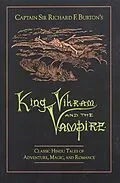Translated by the noted Victorian Orientalist, Sir Richard F. Burton, from the original Sanskrit, these ancient Indian folk tales influenced such later works as 1001 Arabian Nights and Boccaccio's Decameron. First published in 1870, these stories will entertain and delight modern readers while illuminating the life and customs of classical India.
Autorentext
Sir Richard F. Burton (1821-1890) was one of the greatest traveler-explorers of history, whose life has recently been chronicled both in biography (Captain Sir Richard Burton) and film (Mountains of the Moon). Famous as the translator of The 1001 Arabian Nights, Burton also searched for the headwaters of the Nile, and was the discoverer of the central lakes of Africa. Orientalist, prolific author, and member of the Royal Geographic Society, he was one of the most remarkable and controversial men of his century.
Inhalt
Preface
Preface to the First (1870) Edition
Introduction
The Vampire's First Story
In which a Man deceives a Woman
The Vampire's Second Story
Of the Relative Villany of Men and Women
The Vampire's Third Story
Of a High-minded Family
The Vampire's Fifth Story
Of the Thief who Laughed and Wept
The Vampire's Sixth Story
In which Three Men dispute about a Woman
The Vampire's Seventh Story
Showing the exceeding Folly of many wise Fools
The Vampire's Eighth Story
Of the Use and Misuse of Magic Pills
The Vampire's Ninth Story
Showing that a Man's Wife belongs not to his Body but to his Head
The Vampire's Tenth Story
Of the Marvellous Delicacy the Three Queens
The Vampire's Eleventh Story
Which Puzzles Raja Vikram
Conclusion
